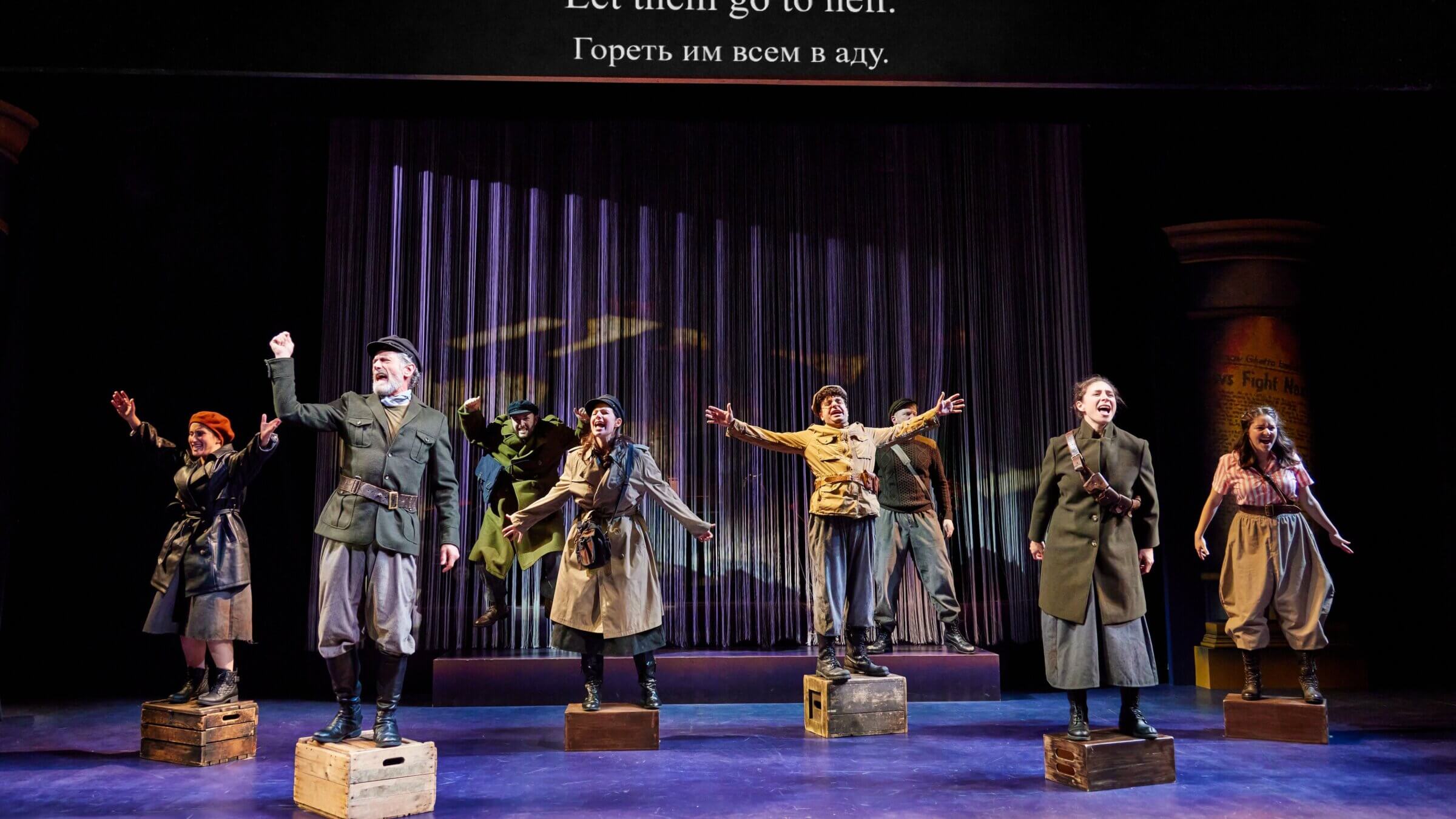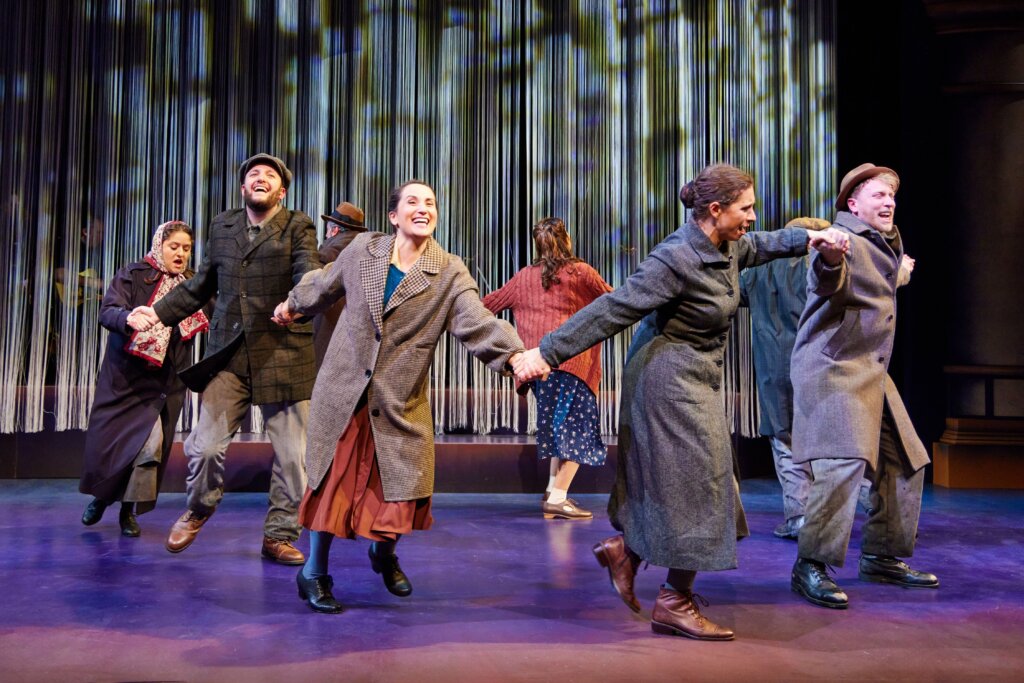A jam-packed history of wartime Yiddish song leaves you wanting both more and less
The Folksbiene’s ‘Amid Falling Walls’ is a grand showcase that’s often hard to follow

The cast of Amid Falling Walls perform a group number. Photo by Jeremy Daniel
Entering the theater for Amid Falling Walls, the new musical at the National Yiddish Theatre Folksbiene, audiences are immediately confronted with a history lesson.
Pillars on either side of the stage, and partial ones staggered above the orchestra, display prewar footage of synagogues, street scenes in cities and shtetls, bearded rebbes and secular Yiddish schools. Slowly the video shifts to propaganda posters of clashing movements — Ze’ev Jabotinsky’s Zionism, the Labor Bund and Soviet Union and the National Socialism that would mark an end to millions of Jewish lives, if not the Jewish spirit.
The preshow sets a tone for a dizzying pageant that, while immensely entertaining when one’s eyes are on the actors, is overwhelming in its glut of context and its understandable commitment to honor the martyred authors of songs that were composed or repurposed in European ghettos, death camps and partisan encampments in the woods.
With a book by Avram Mlotek, who adapted it in part from his father, Folksbiene artistic director and conductor Zalmen Mlotek’s album Ghetto Tango, the musical boasts over two dozen archival songs and, in terms of plot, is a non-chronological showcase of how Jews resisted through music.
There are tangos, music hall numbers, an American jazz standard that added acerbic Yiddish lyrics lampooning the Judenrat (the song “Mues,” performed in brassy fashion by Daniella Rabbani, is as close as the play comes to a conventional scene). There are also stirring anthems, like Hirsh Glick’s Zog Nit Keyn Mol, aka the “Partisan Song,” a lyric from which serves as the musical’s title.
The show is at its strongest when it demonstrates how Jews reimagined the music of peacetime to speak to their dwindling freedoms and new fears under occupation and imprisonment.
Director Motl Didner stages a popular duet, “Brontshele,” in cabaret style, sung by Yael Eden Chanukov and Mikhl Yashinsky. Its original lyrics are about an ingenue’s fear of her father finding out her lover is paying her a visit. After a verse or two, a new couple, played by Abby Goldfarb and Jacob Ben-Schmul, pick up the tune, altering its meaning to address the dread of ghetto authorities discovering a Jew out after curfew.
With a wonderful cast of eight, Amid Falling Walls doesn’t always illustrate the inventiveness of the war years quite so vividly. It falls short of that target by doing too much.

Often, while a choreographed group number is underway, a cast member steps out of the scene to speak the words of a historical figure identified in supertitles on a board above the stage, along with English and Russian translation of the Yiddish quote. Meanwhile, projections on either side feed the audience archival images or a scrolling list of Jewish uprisings.
It’s difficult to know where to look and which piece of information to glom onto — even if you’ve read the dense synopsis in the playbill or the four-page insert breakdown of the songs by U.S. Holocaust Memorial Museum musicologist Bret Werb. I suspect if you speak Yiddish and don’t need to read the captions, it’s a lot easier to follow.
While the performers are given names, they aren’t distinct characters. Steven Skybell, of Yiddish Fiddler fame, is billed as “Mordkhe,” but also plays an anonymous balladeer recounting the tale of a a young partisan named Motele and serves as the mouthpiece of Paper Brigade musicologist Shmerke Kaczerginski. (One wonders what this musical would look like if it simply followed Kaczerginski, who preserved most of the music in this show.)
Standalone songs like “A Yiddish Kinde,” performed by Rabbani as a woman who surrenders her child to gentiles, and “Peshe Fun Reshe,” which brings down the house in Rachel Zatcoff’s operatic register, tell the sort of contained, complete stories the libretto fails to deliver with its brief, intersong vignettes. The play is more a revue or survey, or even, fittingly for the Museum of Jewish Heritage, a museum piece, than a work of coherent drama.
The handful of English lines, which plainly state the show’s thesis of resistance, and pay tribute to the young people who wrote the music and lyrics, suggest that this is the kind of show that could be performed several times a day, at the end of a tour of the main exhibition.
The songs are rousing, the performances powerful and the subject matter as weighty as it gets, yet the show’s breakneck pace and continually shifting locales make it hard to feel a genuine catharsis.
As the show winds down, the faces of the real people who wrote these poems, testimonies and melodies are projected on the set. In paying homage to them all, it’s a challenge to appreciate any one on their own terms.
This is the difficulty of remembering when so much was lost, but often it is through the small, the intimate and the specific that we are best able to recognize the true enormity of that loss. One life contains the world entire — so too does one song.
A message from our Publisher & CEO Rachel Fishman Feddersen

I hope you appreciated this article. Before you go, I’d like to ask you to please support the Forward’s award-winning, nonprofit journalism so that we can be prepared for whatever news 2025 brings.
At a time when other newsrooms are closing or cutting back, the Forward has removed its paywall and invested additional resources to report on the ground from Israel and around the U.S. on the impact of the war, rising antisemitism and polarized discourse.
Readers like you make it all possible. Support our work by becoming a Forward Member and connect with our journalism and your community.
— Rachel Fishman Feddersen, Publisher and CEO






























